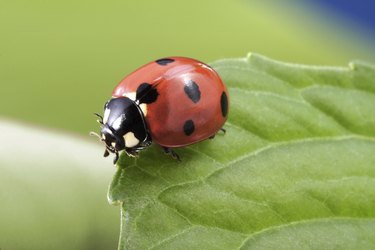Things You'll Need
Quart or gallon containers
Measuring spoons
Spray bottle
Plastic bucket
Rotary or drop spreader
Latex gloves
Eye protection

Beetle bugs go through different life stages as they metamorphose into adults. Although many beetles help protect your plants by eating insect predators, some beetles eat the plants. All plant parts are susceptible to beetle damage, such as the flowers, leaves and fruits. Beetles may attack ornamental plants and edible plants with equal ferocity. The key to controlling them is to use appropriate products that are formulated for different plant types.
Ornamental Plants
Step 1
Prepare an insecticidal spray for adult beetles that contains active ingredients such as carbaryl, dinotefuran or imidacloprid. Typically, mix 2 to 4 tablespoons of chemical in 1 quart to 1 gallon of water. Heed label directions for specific rates.
Video of the Day
Step 2
Pour the mixture around the base of plants or spray onto the foliage, depending on whether you have a soil-drench or foliar-spray product. Observe label directions for individual formulations.
Step 3
Start treating plants when they begin growing in spring. Reapply every six weeks or more often according to recommendations.
Edible Plants
Step 1
Handpick adult beetles from plants and drop them in soapy water to kill them. Remove the beetles in the morning or evening, before they release pheromones that attract other beetles.
Step 2
Dust food crops with a permethrin-based product, which is in a class of organic pesticides. Apply the dust from a shaker canister or puffer so that both sides of the leaves are dusted with a fine layer. Reapply as needed, but do not exceed four dustings each season.
Step 3
Avoid beetle traps. They kill beetles by trapping them, but they attract more bugs to your garden because of the pheromone lure.
Turf Grass
Step 1
Apply a granular pesticide once a year to turf grass that contains the active ingredient chlorantraniliprole. Beetle larvae live underground and eat grass roots before they emerge as foliage- and flower-eating adults in the spring. By killing the larvae, you interrupt the beetle's life cycle and prevent future generations.
Step 2
Use a rotary or drop spreader to apply 2.87 pounds of granules for each 1,000 square feet of lawn. After application, water lightly to activate the pesticide.
Step 3
Wait at least one week after applying beetle pesticide granules to your lawn before applying a weed-and-feed product. If you use a straight fertilizer, which contains no weed-control chemicals, you don't have to wait to apply it.
Warning
Wash hands thoroughly in soapy water after handling pesticides. Don't spray dusts on windy days. Wear eye protection and latex gloves when handling and applying chemicals.
Video of the Day